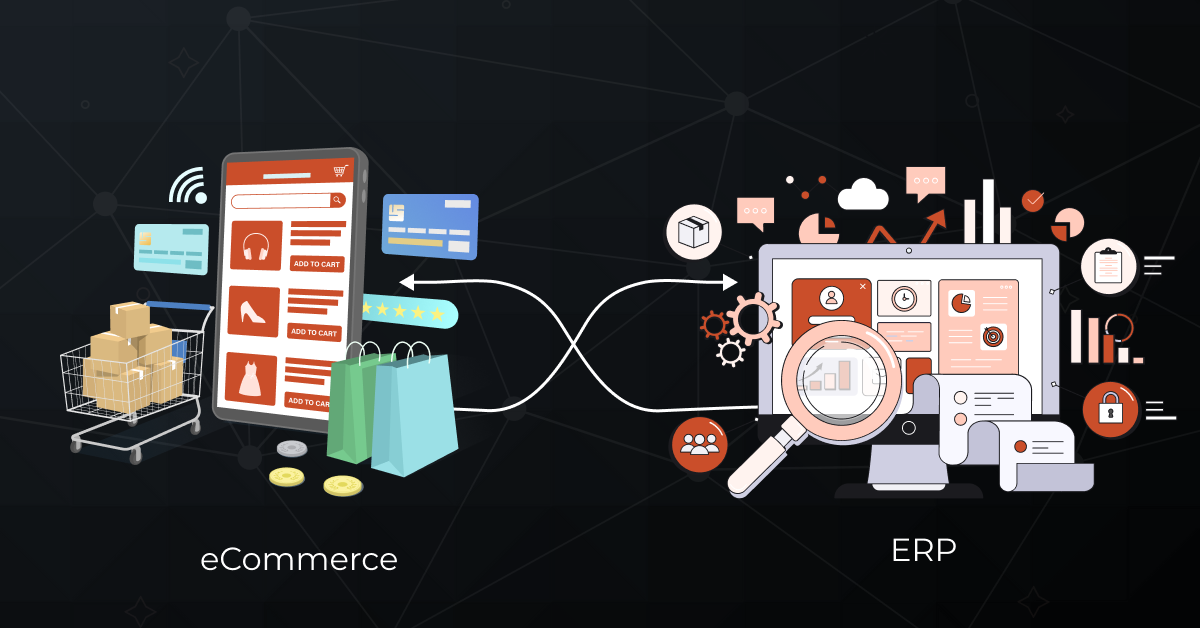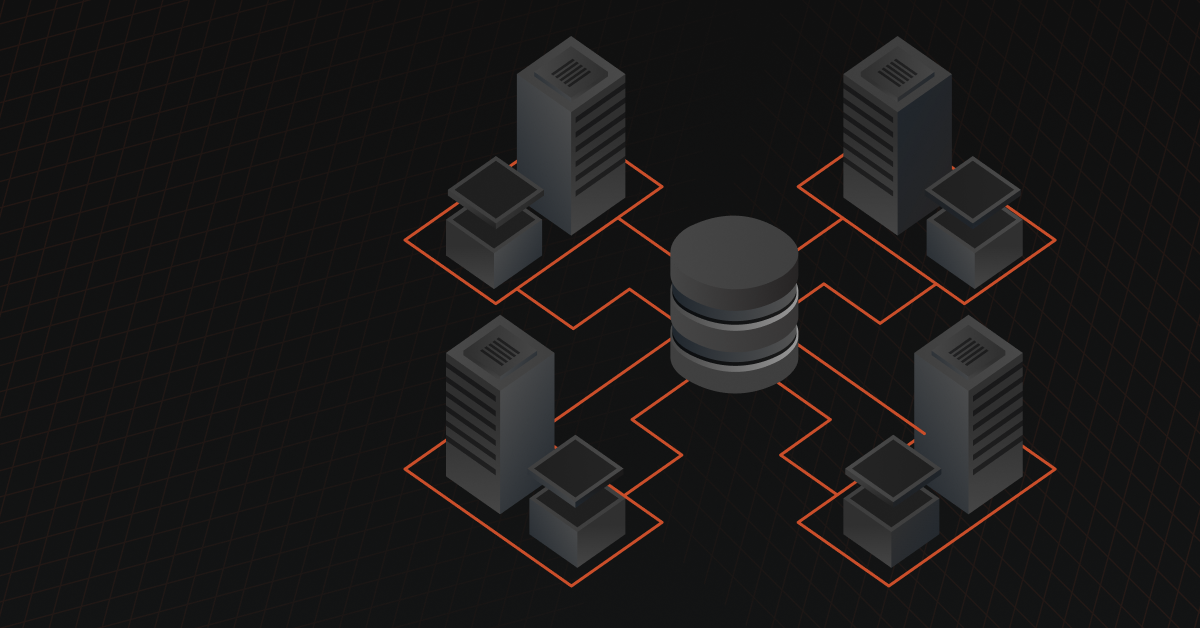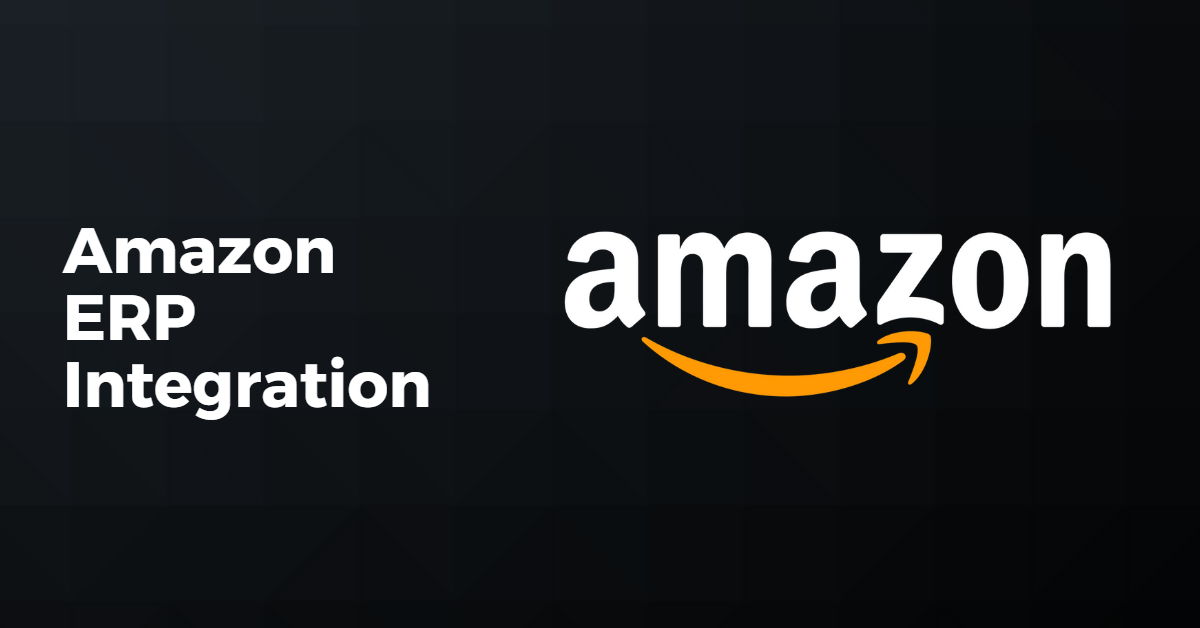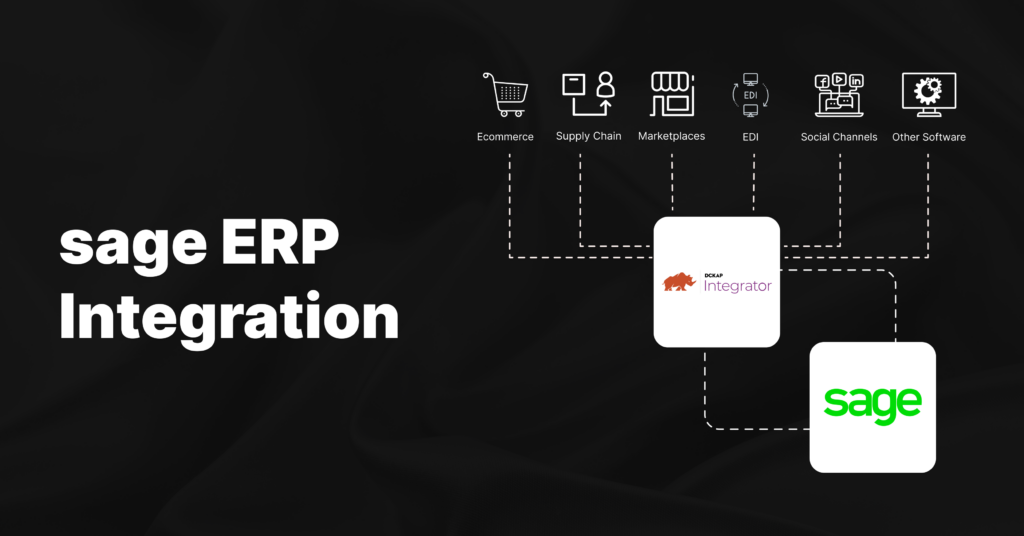Enterprise Resource Planning (ERP) software integrates different business management systems to bring together all facets of a business under a single unit. An eCommerce ERP combines back-office tasks including inventory software, warehouse management, HR duties, and information technology (IT) services, reducing the need for a number of distinct systems.
When you use an ERP to its full potential and integrate it with your eCommerce platform*, you can eliminate information and workflow silos and establish a unified data hub. You’ll notice that everything is better organized and your entire order procedure will quickly become more efficient, with enhanced business reach and streamlined, future-proof operations.
Top 7 ERP Solutions for eCommerce Distributors
Here are some top ERP solutions specially suited for eCommerce distributors. These ERP solutions can be seamlessly integrated into your systems and help optimize your organization’s workflows.
Let’s dive right into their specs and features:
1. Epicor Prophet 21
Epicor Prophet 21 is one of the leading cloud-based ERP solutions for distributors and has been in the industry for over many years. Epicor helps businesses to scale, modernize and streamline businesses. It operates on Microsoft Azure which helps users to work efficiently and build profits by enabling better customer experience.
It offers features like Mobile Order Entry that allows easy access across various devices, and Quote to Order features for increased accuracy. Aggregate sales figures in one window allow users to help buyers make informed decisions, and manage and schedule sales orders for timely deliveries and maximum customer satisfaction.
The CRM provides a complete overview of customer data and opportunities for engagement to make more sales and retain customers. Advanced Inventory Management provides forecasting based on sporadic and seasonal demands, bin management, surplus transfer, lead-time, and vendor-managed inventory. Warehouse Management in Epicor 21 is a wireless solution that brings efficiency to warehouse processes like picking, receiving, cross-docking, put-away, real-time cycle counting, label printing, bar coding, etc. Overall, Epicor 21 is reputed to be a reliable ERP solution for distributors.
2. Sage X3
Sage X3 is a cloud-based ERP software, ideal for manufacturing, wholesale distribution, and service processes. It also offers in-premise ERP solutions to manage core businesses like inventory, sales, customer service, finances, etc.
Sage X3 offers production management, supply chain management, and Financial Management designed to bring collaboration, efficiency, flexibility, and valuable insights into business processes. It enhances the workspace with personalized access to relevant data to help sales, marketing, and customer support team perform with accuracy. It enables cash flow control, procurement, and business purchase.
It also helps manage financial operations with general ledger, cost accounting, and budgeting. Sage X3 creates faster and simpler workspaces at a more affordable cost.
3. Oracle NetSuite
Oracle NetSuite ERP is an all-in-one cloud business management solution that makes it easier for enterprises to run more efficiently. NetSuite ERP offers firms better data visibility and greater corporate control by combining a single, integrated suite of applications for managing accounting, order processing, inventory management, production, supply chain, and warehousing operations.
The Accounting Software improves AR, automates AP, simplifies tax administration and offers businesses a thorough understanding of cash flows and financial health.
Automated inventory management ensures low inventory expenses while fulfilling client delivery demands with sophisticated tools for managing replenishment, identifying reorder points, tracking inventory across different locations, and maximizing safety stock.
Advanced features like wave management, cartonization, cycle count planning, real-time inventory updates, and shipping system integrations streamline warehouse operations with RF-device-directed putaway and pickup duties.
4. Distribution One
Distribution One by Advantive is a ERP software solution for wholesalers and distributors. It helps to leverage company-wide productivity and reduce costs.
It offers some prominent features covered by most ERP solutions. Order management features help streamline order processing and help in rendering effective sales management.
The inventory and warehouse management features help in order replenishment and retains customer relationship with timely order fulfillment. Other features for financial management, and CRM are also designed for distributors and eCommerce businesses to maintain efficiency across processes.
5. DDI System
ERP technology by DDI System provides distributors with the tools they need for industry-specific skills to drive operational excellence, increase margins, and thrive in today’s cutthroat, dynamic environment.
DDI offers a connected ERP for eCommerce that provides seamless online and in-store shopping for customers. CRM tools help users utilize cutting-edge customer interaction solutions to communicate effectively with customers.
Touchscreen technology in mobile business management makes it simple to create a quote or order while on the go. The Sales order control panel Informs users to complete the order entry procedure with real-time data. It also includes demand forecasting with intuitive inventory insight analytics to help business leaders make better decisions. DDI ERP is specifically designed for distributors and eCommerce, enabling them to maximize profits by driving efficiency.
6. SAP
Software for enterprise resource planning, or SAP ERP, was created by SAP SE. SAP is a market-share leader in ERP and a multinational software provider. Although cloud computing solutions are the focus of the majority of its development efforts, the company today provides SAP ERP integration services to more than 180 countries and offers on-premises, cloud, and hybrid deployment types.
The SAP Business Suite’s ERP system, ECC, is at the core of a larger group of modules that manage more typical business operations, like supply chain management (SCM) and product lifecycle management (PLM).
The Business Suite has undergone an extensive overhaul that has been tailored for the SAP HANA in-memory database technology. SAP claims that S/4HANA will simplify things and eventually replace SAP ECC. It offers the benefits of HANA’s in-memory processing and real-time data accessibility within a subscription-based SaaS model.
Originally targeted for SMBs, SAP Business ByDesign is a SaaS ERP solution that now serves the midmarket portion of the SAP product line. SAP Business One, a fourth ERP system, is designed for smaller businesses and may be used on-premises or in the cloud.
7. Acumatica
Acumatica is a Cloud ERP solution and is credited as the fasted growing Cloud ERP company for 6 years. Acumatica is primarily reputed for its great user interface that meets demands of the midmarket companies.
Acumatica ERP integration tools easily integrate with existing systems and help improve efficiencies with intuitive UI. It enables collaboration with modern and cross-module workflows and provides access across all devices being cloud-powered. Acumatica promises an off-the-shelf solution with various personalization opportunities to meet industry-specific demands across businesses.
ERP and Its Basic Elements
ERP solutions automate many tasks and provide you with useful insights into your firm, making paperwork and business workflows far more effective, accurate, and swift. Even your order and supply chain management, payroll duties, and year-end accounting can be made easy.
There are a few crucial aspects that must be included in your ERP search criteria to integrate your eCommerce platform with an ERP solution.
1. Finance
Although there are software that can manage your general ledger (GL), accounts payable (AP), and accounts receivable (AR), a cloud ERP solution enables you to manage those chores while also providing real-time eCommerce updates. For instance, your financial statements and the sales order can be quickly updated when an eCommerce site transaction enters your ERP system. Once the money clears, it is counted as income.
An ERP system also audits your sales, customers (including relationships and potential), inventory, money, and other areas. Your eCommerce platform will become an extension of that auditing system if you integrate it with your ERP.
2. CRM
A successful e-commerce company must be able to track what’s happening at every stage of the sales cycle and have an efficient, standardized way to manage leads, contacts, opportunities, and customer accounts. In other words, you require a CRM solution that is completely linked and provides each department with access to synced, real-time data from a single source.
Building a customer database within integrated solutions enables you to quickly communicate with your customers with offers like sales, discounts, and special promotions. These promotions are created within the e-commerce platform, and the ERP system understands what it’s receiving, making a record for later reporting.
An omnichannel commerce environment is also created through the integration of eCommerce ERP and CRM. Your centralized CRM will link each order to the appropriate customer regardless of how customers purchase your product from you. It offers a 360-degree perspective of the interactions you’ve had in the past and the ones you’re currently having with your customers.
3. Inventory Management
Inventory tracking gets more challenging when business is booming. Customers want to know if a product is in stock, and you need to know where your products are. An integrated ERP system is capable of disseminating this knowledge to all users. It provides precise, real-time access to all available inventory, whether it is in a single warehouse, spread across multiple warehouses, or in transit. You also have access to inventory charges and reorder quantities.
It is no longer necessary to log into different systems to discover the solution because the procedure is automated and there are fewer manual errors (or eliminated).
4. Shipping, Distribution & Warehouse Management
The most effective way to handle your shipping, distribution, and warehouse management requirements is to employ an integrated eCommerce ERP solution, much like inventory management.
Wave and batch selection, packaging, PO receiving, putting away, transferring, and physical counting are just a few of the many steps in the distribution process. These processes are mechanized via ERP. EDI compliance is managed via third-party EDI software, lot and serial number tracking eliminate errors, and warehouse personnel can complete their responsibilities using phones or tablets.
5. Product Information Management
It’s crucial to centralize your product information within an eCommerce ERP solution because you sell things to clients in various ways. This data may include details on your suppliers, product costs, customer-specific costs, or possibly options related to your product. You may distribute your information to numerous sites by managing it in one place.
Recommended Reading: eCommerce POS Integration Made Easy For You
Benefits of The Right ERP for Your eCommerce Business
With the successful adoption of an ERP system, eCommerce enterprises can get a variety of advantages. Due to the speed and volume of their operations, eCommerce companies can greatly benefit from a specialized solution with automation features and seamless integrations to financial data.
Here are a few distinct advantages that online retailers should watch out for when integrating their platform with an ERP system.
Consolidate Sales Numbers
The concentration of sales data from various regions is one of the key advantages of ERP integration for businesses that operate online. When searching for a solution, omnichannel capability is an important factor to take into account, especially if your business conducts sales in various locations.
Keeping sales data structured can be challenging, especially when it comes from numerous different platforms. ERPs combine the data to speed up insight generation. The inclusion of all pertinent data points increases the accuracy of an automated system.
Increase Productivity
The capacity of ERP software to boost operational productivity by integrating diverse procedures and automating the interchange of data is well established. Some ERP software can also automate processes like bank reconciliation and shipment notification sending.
Businesses can perform more tasks in the same amount of time and produce more work by increasing productivity. Additionally, procedures can be made more efficient using automation tools, saving time on document spot checks and human error correction.
Enhance Revenue Generation
Every company is always looking for new ways to make money. ERP solutions can help eCommerce organizations make more money in a variety of ways, including explicit cash-in-hand benefits and implicit revenue advantages with higher efficiencies, automation, etc.
According to Nucleus Research, a business gains by an average of $7.23 for every dollar invested in an ERP system. A good ERP eCommerce integration might therefore result in revenue gains that greatly outweigh the original setup costs.
Improve Customer Relationships
CRM functionality is a common feature of ERP systems, either built-in or as an add-on module. These capabilities allow e-commerce businesses to make use of a consolidated database of client data, allowing your salespeople to tailor sales leads based on sales history, demographics, etc.
Some ERP software automates the process of monitoring shipments and notifying users when a cargo has arrived at its destination. Your business may make a better first impression on customers by optimizing these operations, which can increase your client retention percentage.
Recommended: Top eCommerce Integration Solutions & Tools
Integrating ERP and eCommerce
When your startup or small business—possibly one you started in your garage—evolves into a fully-fledged operation with a warehouse—or two, or three—a shipping fleet, and numerous staff, these become more difficult to balance.
Relying on systems that have been pieced together and forcing them to work through pure effort and determination will no longer work. Lack of data, consistency, and control will hurt everyone.
Fortunately, it is possible to link your ecommerce platform with a contemporary ERP, automating your current processes and procedures and successfully avoiding further data difficulties in the future.
- Modern eCommerce systems and ERP can be combined in a few different ways. The eCommerce solution’s API can be used independently, giving you complete customization, but leaving you solely in charge of managing the integration.
- Using the API, you can use a third-party solution with a pre-built integration that is generally simple to use and can be used “out of the box”. However, if you require any customization, you will have to pay for it and rely on the third-party team.
- Alternatively, you might use an ERP system that readily integrates with eCommerce with native integration technology. The integration will be agile enough to meet the constantly shifting demands of the market when “crazy” business scenarios occur, which they will.
You can read more about this in The Complete Guide to ERP Integration
Conclusion
An ERP for eCommerce renders various challenges faced by distributors obsolete by streamlining, and automating various processes. A great ERP integration vendor combined with the top ERP integration software can be pivotal to achieving its maximum benefits for ERP for eCommerce.
DCKAP Integrator simplifies integration for eCommerce businesses by seamlessly syncing data between CRM, eCommerce platforms, and ERP systems like Epicor Prophet 21, DDI, and Oracle NetSuite. The seamless integration helps you save time with simple integrations that kick-start a better customer relationship across your business.
Interested to know more about DCKAP Integrator? Register here for a customized demo, or check our pricing plans here.
Contents




